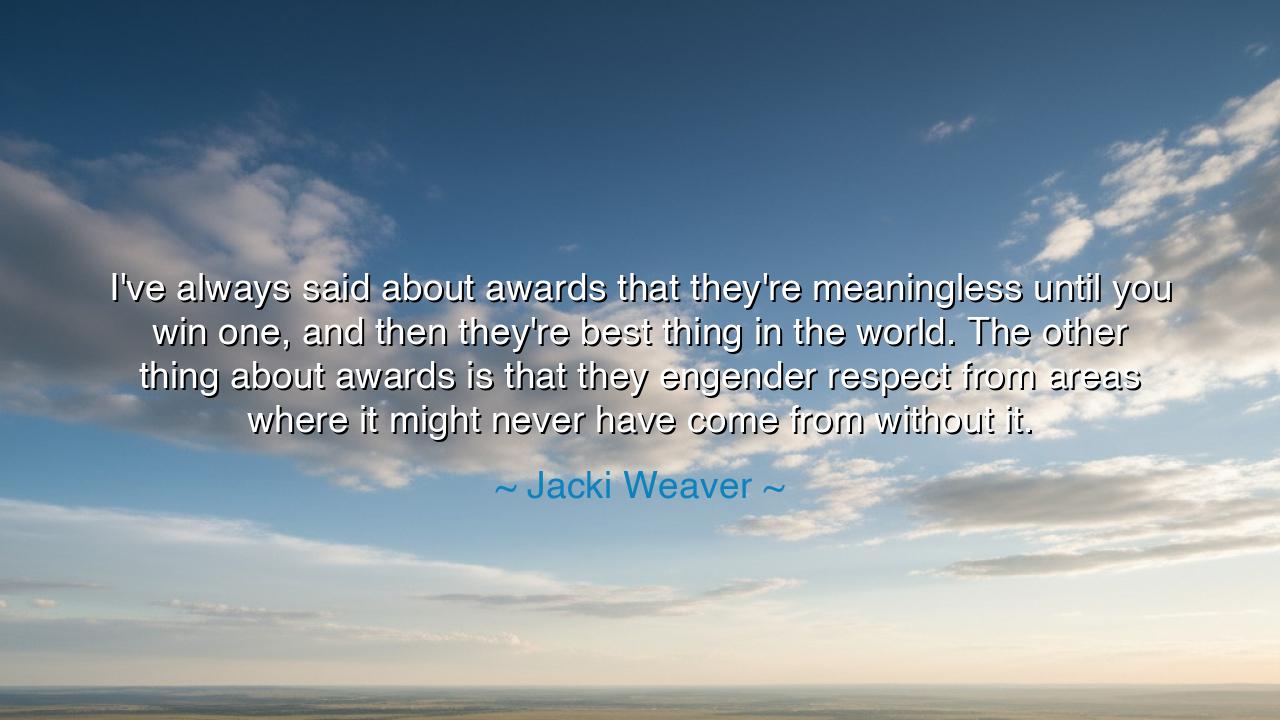
I've always said about awards that they're meaningless until you
I've always said about awards that they're meaningless until you win one, and then they're best thing in the world. The other thing about awards is that they engender respect from areas where it might never have come from without it.






In the words of Jacki Weaver, the luminous actress whose artistry has traversed stage and screen, there is both humor and hard-earned truth: “I've always said about awards that they're meaningless until you win one, and then they're the best thing in the world. The other thing about awards is that they engender respect from areas where it might never have come from without it.” These words, though light in tone, carry the weight of experience — the wisdom of one who has labored long in her craft and knows both the emptiness of external praise and the quiet joy it can still bring. It is a reflection on the dual nature of recognition: how it is both fleeting and powerful, both shallow and deeply human.
Jacki Weaver, an artist of depth and grace, has lived through decades of performance, often celebrated, sometimes overlooked. She speaks here not from vanity, but from clarity — for she understands that the value of an award lies not in the object itself, but in what it symbolizes. To say that awards are “meaningless until you win one” is to acknowledge the irony of human pride. When they belong to others, they seem trivial; when they are placed in our own hands, they suddenly glow with significance. In this duality lies the eternal tension between inner worth and external validation. The wise understand both: that the applause of others cannot define one’s soul, yet it may open doors long closed to it.
There is a certain truth of the heart within this jest. We tell ourselves that honors and trophies are hollow — and in many ways, they are. They fade, they gather dust, they do not guarantee peace or purpose. But when recognition arrives after years of toil, rejection, and perseverance, it carries the sweet scent of justice. For what is an award, truly, but a sign that others have finally seen what was always there? When Weaver says that awards “engender respect from areas where it might never have come from,” she speaks of the strange alchemy of success — how one golden statue, one laurel, can command attention from those who once ignored or doubted. It is not the award that changes the artist, but the world’s perception of them.
History bears many echoes of this truth. Consider Vincent van Gogh, who died poor and uncelebrated, never winning recognition in his lifetime. To him, awards would have seemed meaningless indeed — for no audience applauded his genius while he lived. Yet after his death, when his paintings began to sell for fortunes and his name became immortal, the world awoke to its error. The honors came too late to reach him, but their power still reshaped how generations viewed his work. The lesson is clear: recognition, though shallow in form, has deep influence — it can transform neglect into reverence, and silence into immortality.
In Weaver’s words, however, there is no bitterness — only understanding. She accepts that human nature seeks acknowledgment, and that this yearning is not shameful but universal. The artist creates for the love of creation, yes — but to be respected, to be seen, is also nourishment for the soul. It is not vanity, but validation; not arrogance, but belonging. When others honor our work, it becomes not just our achievement, but a bridge between self and society — a conversation between creator and world. And sometimes, it takes an award for that conversation to be heard.
Yet Weaver’s insight also carries a warning. The artist must never mistake the symbol for the substance. The award can affirm one’s work, but it must never define it. For just as swiftly as recognition comes, it can fade. The applause dies, the lights dim, and what remains is the quiet truth of one’s devotion to the craft. The wise creator, like Weaver herself, learns to cherish the joy of collaboration, discipline, and authenticity — those inner rewards that no panel or jury can give or take away.
So, my children, let this be your lesson: create not for the award, but for the art. Pour yourself into your work because it is your calling, not your ticket to acclaim. And yet, when the world honors you — when the light finally shines upon your effort — receive it with gratitude, not pride. Let it remind you not of your greatness, but of the long road you have walked. Remember that respect, once awakened, must be met with humility; for the true artist is not crowned by trophies, but by character.
And as Jacki Weaver teaches through her laughter and her wisdom, cherish the paradox: that what once seemed meaningless can become meaningful through struggle. That respect, though born of recognition, must be sustained by integrity. And that, in the end, the greatest award is not the statue in your hand, but the peace in your heart — the quiet knowing that you have given your craft your all, and that, for however brief a moment, the world saw and honored your light.






AAdministratorAdministrator
Welcome, honored guests. Please leave a comment, we will respond soon